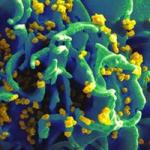
Research Topics
The mission of the Immunology Laboratory (IML) is to investigate novel aspects of the cellular immune response to pathogens in support of the rational development of a vaccine against HIV and other lethal human viral pathogens. It is the goal of the IML to rapidly advance the latest information on ways of manipulating the immune response to HIV into practical applications in clinical trials of prophylactic and therapeutic vaccines. In support of this effort, we emphasize a detailed analysis of the strength, breadth, plasticity, phenotype, and functional characteristics of the cellular immune response to HIV during natural infection and how it does or does not differ from the immune response during other viral infections or that is generated after vaccination.
The overall goals of the IML are accomplished through three projects. First and foremost, understanding how the immune response affects virus acquisition and virus replication—whether in HIV, influenza, or Ebola virus infections—will be crucial in determining appropriate vaccination strategies for these pathogens. In addition, recent successes in the development of vaccines for all three of these agents allow for an interrogation of possible immune correlates. We therefore have a project to evaluate immune correlates of protection from virus infection. Based upon clinical observations, we hypothesize that not all CD4 T cells are infected equally by HIV or SIV, and these differences can affect the differential depletion of CD4 T cells specific for different pathogens. We therefore have a project to investigate HIV/SIV replication in vivo in an effort to determine what cells are infected and depleted by HIV/SIV and what cells are actively expressing HIV/SIV. A beneficial outcome of this project is the ability to specifically target HIV-expressing cells for elimination as part of a cure agenda. The final and newest project derives from the observation that most broadly neutralizing antibodies to HIV have undergone extensive somatic hypermutation. We therefore investigate T follicular helper cells in HIV/SIV pathogenesis and vaccination with the goal of coming up with better strategies to induce the generation of hypermutated neutralizing antibodies to HIV through vaccination. All of the projects help inform decisions on next-generation vaccines.
Biography
Dr. Koup received his B.S. in biophysics in 1978 and his M.S. in biochemistry in 1979 from the University of Connecticut. He attended Johns Hopkins University School of Medicine, where he obtained his M.D. in 1982. Dr. Koup served an internship and residency in internal medicine with the Rhode Island Hospital, Brown University Medical School, Providence, Rhode Island, from 1982 to 1985. He served in a clinical fellowship (infectious diseases) at the Worcester Memorial Hospital and a research fellowship (viral immunology), at UMass Medical Center, Worcester. Dr. Koup is board certified in both internal medicine and infectious diseases. Dr. Koup previously held several academic appointments at the University of Texas Southwestern Medical Center that include chief, division of infectious disease; professor, internal medicine; professor, microbiology; and the Jay P. Sanford Professor of Infectious Diseases.
Selected Publications
- Petrovas C, Yamamoto T, Gerner MY, Boswell KL, Wloka K, Smith EC, Ambrozak DR, Sandler NG, Timmer KJ, Sun X, Pan L, Poholek A, Rao SS, Brenchley JM, Alam SM, Tomaras GD, Roederer M, Douek DC, Seder RA, Germain RN, Haddad EK, Koup RA. CD4 T follicular helper cell dynamics during SIV infection. J Clin Invest. 2012;122(9):3281-94.
- Hataye JM, Casazza JP, Best K, Liang CJ, Immonen TT, Ambrozak DR, Darko S, Henry AR, Laboune F, Maldarelli F, Douek DC, Hengartner NW, Yamamoto T, Keele BF, Perelson AS, Koup RA. Principles Governing Establishment versus Collapse of HIV-1 Cellular Spread. Cell Host Microbe. 2019;26(6):748-763.e20.
- Asokan M, Dias J, Liu C, Maximova A, Ernste K, Pegu A, McKee K, Shi W, Chen X, Almasri C, Promsote W, Ambrozak DR, Gama L, Hu J, Douek DC, Todd JP, Lifson JD, Fourati S, Sekaly RP, Crowley AR, Ackerman ME, Ko SH, Kilam D, Boritz EA, Liao LE, Best K, Perelson AS, Mascola JR, Koup RA. Fc-mediated effector function contributes to the in vivo antiviral effect of an HIV neutralizing antibody. Proc Natl Acad Sci U S A. 2020;117(31):18754-18763.
- Petrovas C, Casazza JP, Brenchley JM, Price DA, Gostick E, Adams WC, Precopio ML, Schacker T, Roederer M, Douek DC, Koup RA. PD-1 is a regulator of virus-specific CD8+ T cell survival in HIV infection. J Exp Med. 2006;203(10):2281-92.
- Gonelli CA, King HAD, Ko S, Fennessey CM, Iwamoto N, Mason RD, Heimann A, Flebbe DR, Todd JP, Foulds KE, Keele BF, Lifson JD, Koup RA, Roederer M. Antibody prophylaxis may mask subclinical SIV infections in macaques. Nature. 2025;639(8053):205-213.
Related Scientific Focus Areas
This page was last updated on Thursday, August 14, 2025


